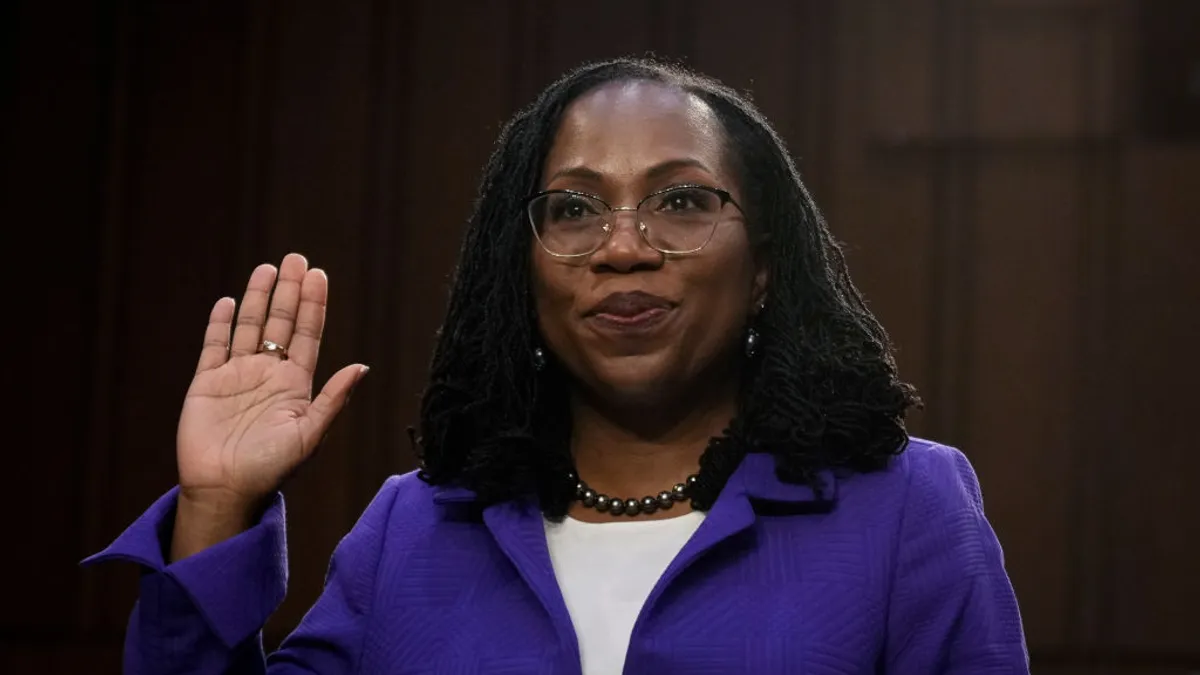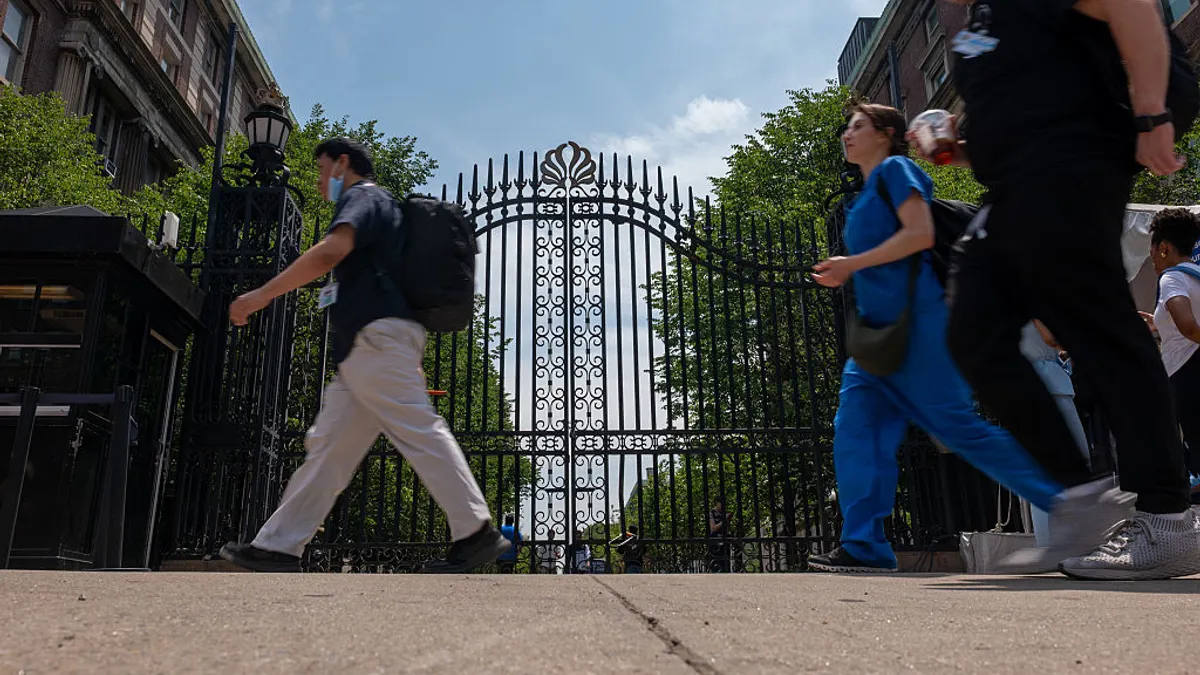Ketanji Brown Jackson likely will bring a pragmatic and balanced approach to employment law decisions at the U.S. Supreme Court, according to attorneys in the field.
The U.S. Senate confirmed in a 53-47 vote the nomination of federal appeals court judge Jackson to serve as an associate justice of the Supreme Court. In the days following the April 7 vote, observers have largely focused on the historic nature of Jackson's confirmation.
"After 115 prior justices have been appointed, a Black woman finally has the opportunity to serve—and it's about time," Joni Madison, interim president of the Human Rights Campaign, said in a statement provided to HR Dive in an email. "This moment is powerful, meaningful, and long overdue."
The high court's latest ascendent may not do much in the near term to change the court's ideological composition by taking the place of outgoing Associate Justice Stephen Breyer, but Jackson brings a "well-developed body of employment law decisions," according to management-side attorneys at Jackson Lewis.
"Essentially, when you view her employment law decisions, what you find is that she is what we consider a pragmatist and very middle-of-the-road," said Stephanie E. Lewis, office managing principal at Jackson Lewis' Greenville, South Carolina, office. "There doesn't appear to be any ideological bias."
Lewis pointed to a series of cases that she said demonstrate Jackson's approach to certain claims under federal employment laws such as the Rehabilitation Act, the Americans with Disabilities Act, Title VII of the Civil Rights Act and the Age Discrimination in Employment Act.
On disability discrimination cases
In the 2015 case Von Drasek v. Burwell, a chemist in the U.S. Food and Drug Administration with bipolar disorder alleged that the agency violated the Rehabilitation Act. The chemist's supervisor had placed her on a performance improvement plan, and she later informed the supervisor about her previously undisclosed diagnosis. Following her termination, the chemist claimed that the FDA failed to accommodate her disability, intentionally discriminated against her because of her disability and discharged her in retaliation for an accommodations request.
Jackson held that while the FDA had a duty to consider the chemist's request, the court would enter summary judgment for the FDA on the chemist's intentional discrimination and retaliation claims, holding further that evidence failed to satisfy the Rehabilitation Act's but-for causation requirement.
Then, in the 2019 case Mitchell v. Pompeo, Jackson denied summary judgment to both a plaintiff and defendant in the case of a special agent candidate for the U.S. Department of State, who alleged the agency failed to accommodate her disability. The candidate, who had asthma, made several accommodation requests, while the State Department argued that the candidate could not perform the essential functions of the job.
Jackson held that although the candidate did not present any evidence from which a jury could infer that she could perform the essential functions of a Special Agent position, even with an accommodation, another position may have existed within the department that the candidate could have performed.
With respect to Von Drasek in particular, Jackson's ruling showed a grasp of the interactive process in which employers are expected to engage, said Charlotte Garry Carne, senior counsel at Dykema Gossett.
On race discrimination cases
Jackson held in favor of Lockheed Martin in 2017, when a group of more than 5,500 of the company's African American employees attempted to certify a class for settlement purposes. The plaintiffs alleged that Lockheed Martin's performance review process gave lower overall ratings to African American employees below the level of vice president compared to similarly situated White employees.
In her ruling for the case, Ross v. Lockheed Martin, Jackson said the plaintiffs "do not present any theory of how the performance appraisal system resulted in racially disparate outcomes, much less evidence that the challenged system discriminates against all class members in the same way," as required by federal law.
Years earlier, Jackson entered summary judgment in favor of the Architect of the Capitol, a federal agency, in the case of an employee who alleged discrimination on the basis of race, national origin and age. The employee, an African American individual from Jamaica, claimed that a supervisor who had discriminated against him was part of a hiring panel that refused to select him for a higher-grade position at the agency.
Overall, Jackson's case analytics included more than 300 employment-related cases during her term on the D.C. Circuit, according to Carne. "I think HR managers and people who work in HR should be heartened by the appointment," Carne continued. "She's had tremendous experience with employment law cases, and she really does know the law regarding the ADA, Section 504 [of the Rehabilitation Act] and some of the other disability discrimination statutes and general discrimination statutes."
On tap for the high court: Arbitration
Jackson's appointment aside, Lewis said the Supreme Court has an "important trio" of cases on its docket impacting various aspects of arbitration that may be of interest to employers. In March, the court heard oral arguments in Viking River Cruises v. Moriana, Southwest Airlines v. Saxon and Morgan v. Sundance.
In Moriana, the justices have been asked to determine whether the Federal Arbitration Act requires enforcement of an arbitration agreement that would otherwise be considered unenforceable under state law — in this case, California's Private Attorneys General Act, or PAGA.
In Saxon, the justices will determine whether workers who load or unload goods from vehicles that participate in interstate commerce, such as the "ramp agents" that load and unload bags on airplanes, are considered transportation workers for the purposes of the FAA.
Finally, in Sundance, the court will determine whether a franchising company effectively waived its right to arbitration when it decided to litigate an employee's case rather than immediately compel arbitration via an arbitration clause in the employment agreement.






















